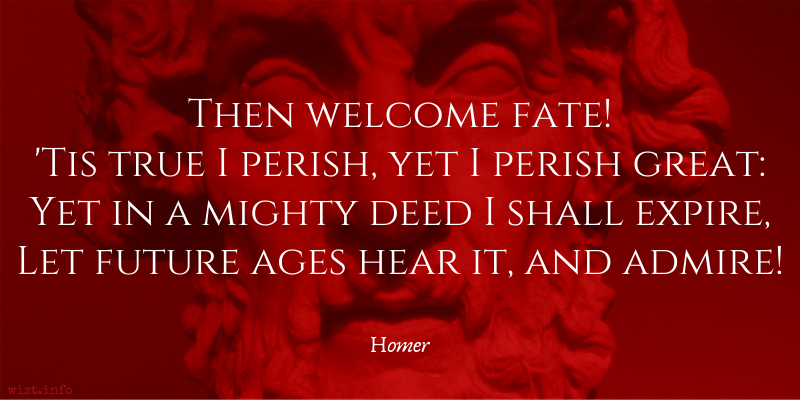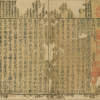The neurotic feels as though trapped in a gas-filled room where at any moment someone, probably himself, will strike a match.
Mignon McLaughlin (1913-1983) American journalist and author
The Second Neurotic’s Notebook, ch. 4 (1966)
(Source)
Quotations about:
doom
Note not all quotations have been tagged, so Search may find additional quotes on this topic.
An evil doom of some god was my undoing, and measureless wine.
[ἆσέ με δαίμονος αἶσα κακὴ καὶ ἀθέσφατος οἶνος.]
Homer (fl. 7th-8th C. BC) Greek author
The Odyssey [Ὀδύσσεια], Book 11, l. 61 (11.61) [Elpenor] (c. 700 BC) [tr. Murray (1919)]
(Source)
Odysseus first encounter in the Underworld is the shade of his comrade Elpenor, whose body had been left on Circe's island. This is Elpenor's explanation of his death (10.552-560). Drunk with his crew mates, he climbed a ladder to the roof of Circe's palace to sleep it off. When he heard his friends preparing to leave, he either fell from or forgot about using the ladder, plummeting to his ignominious death.
(Source (Greek)). Alternate translations:
In Circe’s house, the spite some spirit did bear,
And the unspeakable good liquor there,
Hath been my bane.
[tr. Chapman (1616)]
I had come along with th’ bark,
But that the Devil and excess of wine
Made me to fall, and break my neck i’ th’ dark.
[tr. Hobbes (1675), l. 54ff]
To hell my doom I owe,
Demons accursed, dire ministers of woe!
My feet, through wine unfaithful to their weight,
Betray'd me tumbling from a towery height.
[tr. Pope (1725)]
Fool’d by some dæmon and the intemp’rate bowl.
[tr. Cowper (1792), ll. 69-70]
I died
By stroke of fate and the dread fumes of wine.
[tr. Worsley (1861), st. 9]
Ill fate destroyed me, and unstinted wine!
[tr. Bigge-Wither (1869)]
An evil doom of some god was my bane, and wine out of measure.
[tr. Butcher/Lang (1879)]
God's doom and wine unstinted on me the bane hath brought.
[tr. Morris (1887)]
Heaven's cruel doom destroyed me, and excess of wine.
[tr. Palmer (1891)]
It was all bad luck, and my own unspeakable drunkenness.
[tr. Butler (1898)]
It was all bad luck of a daimôn, and my own unspeakable drunkenness.
[tr. Butler (1898), rev. Power/Nagy (1900)]
It was all bad luck of a superhuman force [daimōn], and my own unspeakable drunkenness.
[tr. Butler (1898), rev. Kim/McCray/Nagy/Power (2018)]
The harsh burden of some God sealed my doom, together with my own unspeakable excess in wine.
[tr. Lawrence (1932)]
It was the malice of some evil power that was my undoing, and all the wine I swilled before I went to sleep in Circe’s palace.
[tr. Rieu (1946)]
Bad luck shadowed me, and no kindly power;
ignoble death I drank with so much wine.
[tr. Fitzgerald (1961)]
The evil will of the spirit and the wild wine bewildered me.
[tr. Lattimore (1965)]
My undoing lay
in some god sending down my dismal fate
and in too much sweet wine.
[tr. Mandelbaum (1990)]
The doom of an angry god, and god knows how much wine --
they were my ruin, captain.
[tr. Fagles (1996)]
Bad luck and too much wine undid me.
[tr. Lombardo (2000)]
The malicious decree of some god and too much wine were my undoing.
[tr. DCH Rieu (2002)]
It was a god-sent evil destiny that ruined me, and too much wine.
[tr. Verity (2016)]
But I had bad luck from some god, and too much wine befuddled me.
[tr. Wilson (2017)]
Some god's ill-will undid me -- that, and too much wine!
[tr. Green (2018)]
Some fatal deity
has brought me down -- that and too much wine.
[tr. Johnston (2019)]
Now, now, my sister, the Fates are in command.
Don’t hold me back. Where God and relentless
Fortune call us on, that’s the way we go![Iam iam fata, soror, superant; absiste morari;
quo deus et quo dura vocat Fortuna, sequamur.]Virgil (70-19 BC) Roman poet [b. Publius Vergilius Maro; also Vergil]
The Aeneid [Ænē̆is], Book 12, l. 676ff (12.676-677) [Turnus] (29-19 BC) [tr. Fagles (2006)]
(Source)
Declaring to his sister that, despite her attempts to protect him, Fate dictates he face Aeneas in (likely fatal) battle.
(Source (Latin)). Alternate translations:
Fate calls now, sister, there is no delay:
What God and hard chance bids, we must obey.
[tr. Ogilby (1649)]
Sister, the Fates have vanquish'd: let us go
The way which Heav'n and my hard fortune show.
[tr. Dryden (1697)]
Sister, now, now, destiny prevails; forbear to stop me; let us follow whither god and rigid fortune calls.
[tr. Davidson/Buckley (1854)]
The Fates, the Fates must have their way:
O sister! cease to breed delay:
Where Heaven and cruel Fortune call,
There let me follow to my fall.
[tr. Conington (1866)]
Now, sister, now the fates prevail.
Bid me not pause. Wherever Heaven may lead
And Fortune stern, let us pursue our course.
[tr. Cranch (1872), l. 856ff]
Now, O my sister, now fate prevails: cease to hinder; let us follow where deity and stern fortune call.
[tr. Mackail (1885)]
Now, sister, now the Fates prevail! no more for tarrying try.
Nay, let us follow where the God, where hard Fate calleth me!
[tr. Morris (1900)]
"Sister," he cries, "Fate conquers; let us go
The way which Heaven and cruel fortune show."
[tr. Taylor (1907), st. 88, l. 787ff]
Fate is too strong, my sister! Seek no more
to stay the stroke. But let me hence pursue
that path where Heaven and cruel Fortune call.
[tr. Williams (1910)]
Now, my sister, now Fate triumphs: cease to hinder; where God and cruel Fortune call, let us follow!
[tr. Fairclough (1918)]
Fate is the winner now; keep out of my way,
My sister: now I follow god and fortune.
[tr. Humphries (1951)]
The fates are too strong for me, sister -- I see it now. Don't hold me back;
Let me go where God and my own unmerciful fortune call me.
[tr. Day-Lewis (1952)]
Sister, fate has won; do not
delay me; let us follow where both god
and cruel fortune call.
[tr. Mandelbaum (1971), l. 900ff]
Ah, sister, see, fate overpowers us.
No holding back now. We must follow where
The god calls, or implacable Fortune calls.
[tr. Fitzgerald (1981), l. 915ff]
"Sister," he said, "the time has come at last. The Fates are too strong. You must not delay them any longer. Let us go where God and cruel fortune call me."
[tr. West (1990)]
Now, sister, now fate triumphs: no more delays:
where god and cruel fortune calls, let me follow.
[tr. Kline (2002)]
Now, Sister, the Fates triumph at last.
Stop holding me back. We will follow
Where God and cruel Fortune call us.
[tr. Lombardo (2005)]
Sister, fate has won. Stop delaying me.
Let's go where Jove and heartless Fortune call.
[tr. Bartsch (2021)]
‘A time may come soon,’ said he, ‘when none will return. Then there will be need of valour without renown, for none shall remember the deeds that are done in the last defence of your homes. Yet the deeds will not be less valiant because they are unpraised.’
J.R.R. Tolkien (1892-1973) English writer, fabulist, philologist, academic [John Ronald Reuel Tolkien]
The Lord of the Rings, Vol. 3: The Return of the King, Book 5, ch. 2 “The Passing of the Grey Company” [Aragorn to Éowyn] (1955)
(Source)
“What do you think is going on, anyway?”
Some horrible Wagnerian thing, I told him, full of blood, thunder, and death for us all.
“Oh, the usual,” Luke said.
Exactly, I replied.
Roger Zelazny (1937-1995) American writer
“Coming to a Cord,” Pirate Writings, #7 [Frakir] (1995)
(Source)
Those fools
were not aware that now they all were snared,
that death cords lashed them fast.[τὸ δὲ νήπιοι οὐκ ἐνόησαν,
ὡς δή σφιν καὶ πᾶσιν ὀλέθρου πείρατ᾽ ἐφῆπτο.]Homer (fl. 7th-8th C. BC) Greek author
The Odyssey [Ὀδύσσεια], Book 22, l. 32ff (22.32) (c. 700 BC) [tr. Mandelbaum (1990)]
(Source)
(Source (Greek)). Alternate translations:
O fools, to think
That all their rest had any cup to drink
But what their great Antinous began!
[tr. Chapman (1616)]
For, proud and foolish, they perceived not
The fatal hour was to them all arriv’d.
[tr. Hobbes (1675), l. 27ff]
Blind as they were: for death e'en now invades
His destined prey, and wraps them all in shades.
[tr. Pope (1725)]
Nor saw
Th’ infatuate men fate hov’ring o’er them all.
[tr. Cowper (1792), ll. 34-35]
How fatal and how nigh
Death's snares were set, they foolish never knew!
[tr. Worsley (1861), st. 5]
Yet this the fools knew not
That now them all the goal of death was touching!
[tr. Bigge-Wither (1869)]
Insensate they!
Who felt not in that hour that one and all
Upon the verge of their own ruin stood!
[tr. Musgrave (1869), l. 54ff]
But they knew not in their folly that on their own heads, each and all of them, the bands of death had been made fast.
[tr. Butcher/Lang (1879)]
And they had no understanding, fools as they were, and vain,
That to all the end of the Death-doom was hard upon them now.
[tr. Morris (1887), ll. 32-33]
They foolishly did not see that for them one and all destruction's cords were knotted.
[tr. Palmer (1891)]
And did not perceive that death was hanging over the head of every one of them.
[tr. Butler (1898)]
In their folly they knew not this, that over themselves one and all the cords of destruction had been made fast.
[tr. Murray (1919)]
... their infatuation hiding from them the toils of death that enlaced each and every one.
[tr. Lawrence (1932)]
It had not dawned upon the fools that every one of them was marked for slaughter too.
[tr. Rieu (1946)]
Fools, not to comprehend
they were already in the grip of death.
[tr. Fitzgerald (1961)]
They had not yet realized
how over all of them the terms of death were now hanging.
[tr. Lattimore (1965)]
The fools did not perceive
That already the bond of destruction were fastened on them all.
[tr. Cook (1967)]
Poor fools, blind to the fact
that all their necks were in the noose, their doom sealed.
[tr. Fagles (1996)]
And had no idea of how tightly the net
Had been drawn around them.
[tr. Lombardo (2000)]
And the poor fools never suspected how on all of the suitors the grim death bindings were fastened.
[tr. Merrill (2002)]
It had not dawned upon the fools that the fate of all of them was sealed.
[tr. DCH Rieu (2002)]
Fools, who did not understand that on every one of them death's ropes were now fastened tight.
[tr. Verity (2016)]
Those poor fools did not know [...] that the snares of death were round them all.
[tr. Wilson (2017)]
Poor fools, they had no notion that over them all the bonds of destruction were set.
[tr. Green (2018)]
In their folly,
they did not understand that they were now enmeshed
in destruction’s net.
[tr. Johnston (2019), ll. 39-41]
All deaths are dour: the fate of men is sad; but there’s no death more miserable than the doom starvation sends.
[Πάντες μὲν στυγεροὶ θάνατοι δειλοῖσι βροτοῖσι,
λιμῷ δ’ οἴκτιστον θανέειν καὶ πότμον ἐπισπεῖν.]Homer (fl. 7th-8th C. BC) Greek author
The Odyssey [Ὀδύσσεια], Book 12, l. 341ff (12.341-342) [Eurylochus] (c. 700 BC) [tr. Mandelbaum (1990)]
(Source)
Urging is fellow sailors to slaughter the Sun God's cattle. That ends poorly.Original Greek. Alternate translations:
Hear what I shall say,
Though words will staunch no hunger, ev’ry death
To us poor wretches that draw temporal breath
You know is hateful; but, all know, to die
The death of Famine is a misery
Past all death loathsome.
[tr. Chapman (1616)]
Meantime Eurylochus bad counsel gives
To his companions. All deaths, quoth he,
Are hateful to what thing soever lives;
But death by hunger is the worst can be.
[tr. Hobbes (1675)]
O friends, a thousand ways frail mortals lead
To the cold tomb, and dreadful all to tread;
But dreadful most, when by a slow decay
Pale hunger wastes the manly strength away.
[tr. Pope (1725)]
Death, however caused,
Abhorrence moves in miserable man,
But death by famine is a fate of all
Most to be fear’d.
[tr. Cowper (1792)]
Friends, though to wretched men all deaths are dire,
Yet it is far most miserable to pine
With pangs of famine and for want expire.
[tr. Worsley (1861), st. 47]
Death is in all shapes to unhappy men
A fearful fate: but misery extreme
Were it our own destruction to provoke
And die of hunger.
[tr. Musgrave (1869), l. 515ff]
All deaths are hateful to us wretched mortals;
But death by famine is most pitiable.
[tr. Bigge-Wither (1869)]
Truly every shape of death is hateful to wretched mortals, but to die of hunger and so meet doom is most pitiful of all.
[tr. Butcher/Lang (1879)]
All manner of death is loathly to wretched men that die,
But to meet our fate by famine is to end most wretchedly.
[tr. Morris (1887)]
Hateful is every form of death to wretched mortals; and yet to die by hunger, and so to meet one's doom, is the most pitiful of all.
[tr. Palmer (1891)]
All deaths are bad enough, but there is none so bad as famine.
[tr. Butler (1898)]
All forms of death are hateful to wretched mortals, but to die of hunger, and so meet one's doom, is the most pitiful.
[tr. Murray (1919)]
No variety of death is pleasing to us poor mortals: but commend me to hunger and its slow perishing as the meanest fate of all.
[tr. Lawrence (1932)]
To us wretched men all forms of death are abominable, but death by starvation is the most miserable end that one can meet.
[tr. Rieu (1946)]
All deaths are hateful to us, mortal wretches, but famine is the most pitiful, the worst end that a man can come to.
[tr. Fitzgerald (1961)]
All deaths are detestable for wretched mortals,
but hunger is the sorriest way to die and encounter fate.
[tr. Lattimore (1965)]
All ways of dying are hateful to us poor mortals,
true, but to die of hunger, starve to death --
that's the worst of all.
[tr. Fagles (1996)]
Every manner of dying is hateful to miserable mortals,
but most wretched by hunger to die and encounter our doomsday.
[tr. Merrill (2002)]
To us wretched men all forms of death are abominable,
but death by starvation is the most miserable way to meet one's doom.
[tr. DCH Rieu (2002)]
All ways of dying are hateful to wretched mortals, but the most miserable way to meet one's doom is by hunger.
[tr. Verity (2016)]
All human deaths are hard to bear. But starving is most miserable of all.
[tr. Wilson (2017)]
All kinds of death are loathsome to wretched mortals,
but to die of starvation -- that's the most pitiful of fates!
[tr. Green (2018)]
For wretched human beings
all forms of death are hateful. But to die
from lack of food, to meet one’s fate like that,
is worst of all. [tr. Johnston (2019), l. 445ff]
We are all at a wonderful ball where the champagne sparkles in every glass and soft laughter falls upon the summer air. We know, by the rules, that at some moment the Black Horsemen will come shattering through the great terrace doors, wreaking vengeance and scattering the survivors. Those who leave early are saved, but the ball is so splendid no one wants to leave while there is still time, so that everyone keeps asking, “What time is it? What time is it?” but none of the clocks have any hands.
George Goodman (1930-2014) American author, economics broadcast commentator [pseud. Adam Smith]
Supermoney, Part 3, ch. 2 (1972)
(Source)
An explanation he gave to a "mass-circulation magazine" about the stock bubble in 1968. He later incorporated a variation of the story in a republication of his 1968 The Money Game:
We are all at a wonderful party, and by the rules of the game we know that at some point in time the Black Horsemen will burst through the great terrace doors to cut down the revelers; those who leave early may be saved, but the music and wines are so seductive that we do not want to leave, but we do ask, "What time is it? What time is it?" Only none of the clocks have any hands.
Then welcome fate!
‘Tis true I perish, yet I perish great:
Yet in a mighty deed I shall expire,
Let future ages hear it, and admire![νῦν αὖτέ με μοῖρα κιχάνει.
μὴ μὰν ἀσπουδί γε καὶ ἀκλειῶς ἀπολοίμην,
ἀλλὰ μέγα ῥέξας τι καὶ ἐσσομένοισι πυθέσθαι.]Homer (fl. 7th-8th C. BC) Greek author
The Iliad [Ἰλιάς], Book 22, l. 303ff (22.303) [Hector] (c. 750 BC) [tr. Pope (1715-20), l. 385ff]
(Source)
Original Greek. Alternate translations:
But Fate now conquers; I am hers; and yet not she shall share
In my renown; that life is left to every noble spirit,
And that some great deed shall beget that all lives shall inherit.
[tr. Chapman (1611), l. 266ff]
But I will not fall
Inglorious; I will act some great exploit
That shall be celebrated ages hence.
[tr. Cowper (1791), l. 347ff]
Fate overtakes me. Nevertheless I will not perish cowardly and ingloriously at least, but having done some great deed to be heard of even by posterity.
[tr. Buckley (1860)]
My fate hath found me now.
Yet not without a struggle let me die,
Nor all inglorious; but let some great act,
Which future days may hear of, mark my fall.
[tr. Derby (1864)]
Now my fate hath found me. At least let me not die without a struggle or ingloriously, but in some great deed of arms whereof men yet to be born shall hear.
[tr. Leaf/Lang/Myers (1891)]
My doom has come upon me; let me not then die ingloriously and without a struggle, but let me first do some great thing that shall be told among men hereafter.
[tr. Butler (1898)]
Now again is my doom come upon me. Nay, but not without a struggle let me die, neither ingloriously, but in the working of some great deed for the hearing of men that are yet to be.
[tr. Murray (1924)]
But now my death is upon me. Let me at least not die without a struggle, inglorious, but do some big thing first, that men to come shall know of it.
[tr. Lattimore (1951)]
Now the appointed time's upon me. Still, I would not die without delivering a stroke, or die ingloriously, but in some action memorable to men in days to come.
[tr. Fitzgerald (1974)]
So now I meet my doom. Well let me die --
but not without struggle, not without glory, no,
in some great clash of arms that even men to come
will hear of down the years!
[tr. Fagles (1990), l. 359ff]
But now has my doom overcome me. But let me at least not die without making a fight, without glory, but a great deed having done for the men of the future to hear of.
[tr. Merrill (2007)]
May I not die without a fight and without glory
but after doing something big for men to come to learn about.
[tr. @Sentantiq (2011)]
Idiot, not to know
his days are numbered who would fight the gods!
His children will not sing around his knees
“Papà! Papà!” on his return from war.Ὅττι μάλ’ οὐ δηναιὸς ὃς ἀθανάτοισι μάχηται,
οὐδέ τί μιν παῖδες ποτὶ γούνασι παππάζουσιν
ἐκ πολέμοιο καὶ αἰνῆς δηϊοτῆτος.Homer (fl. 7th-8th C. BC) Greek author
The Iliad [Ἰλιάς], Book 5, l. 407ff (5.407-409) (c. 750 BC) [tr. Fitzgerald (1974), l. 467ff]
(Source)
Alt. trans.:
Not knowing he that fights with Heav’n hath never long to live,
And for this deed, he never shall have child about his knee
To call him father, coming home.
[tr. Chapman (1611), ll. 387-89]
No man who fights with gods will live long or hear his children prattling about his knees when he returns from battle.
[tr. Butler (1898)]
Know thou, whoe'er with heavenly power contends,
Short is his date, and soon his glory ends;
From fields of death when late he shall retire,
No infant on his knees shall call him sire.
[tr. Pope (1715-20)]
Infatuate! he forgets
That whoso turns against the Gods his arm
Lives never long; he never, safe escaped
From furious fight, the lisp’d caresses hears
Of his own infants prattling at his knees.
[tr. Cowper (1791), ll. 474-78]
Infatuate! nor does the son of Tydeus know this in his mind, that he is by no means long-lived who fights with the immortals, nor ever at his knees will sons lisp a father’s name, as he returns from war and dreadful battle.
[tr. Buckley (1860)]
Unknowing he how short his term of life
Who fights against the Gods! for him no child
Upon his knee shall lisp a father's name,
Safe from the war and battle-field return'd.
[tr. Derby (1864), ll. 463-466]
Verily he endureth not for long who fighteth with the immortals, nor do his children prattle about his knees when he is come back from war and the dread conflict.
[tr. Murray (1924)]
That man who fights the immortals lives for no long time, his children do not gather to his knees to welcome their father when he returns home after the fighting and the bitter warfare.
[tr. Lattimore (1951)]
Doesn't the son of Tydeus know, down deep,
the man who fights the gods does not live long?
Nor do his children ride his knees with cries of 'Father' --
home at last from the wars and heat of battle.
[tr. Fagles (1990), ll. 465-468]
H.G. Wells said that history was a race between education and catastrophe, and it may be that the writer will add just sufficient impetus to education to enable it to outrace catastrophe. And if education wins by even the narrowest of margins, how much more can we ask for?
The salvation of America and of the human race depends on the next election, if we believe the newspapers. But so it was last year, and so it was the year before, and our fathers believed the same thing forty years ago.
Woe to those who make unjust laws,
to those who issue oppressive decrees,
to deprive the poor of their rights
and withhold justice from the oppressed of my people,
making widows their prey
and robbing the fatherless.
What will you do on the day of reckoning,
when disaster comes from afar?
To whom will you run for help?
Where will you leave your riches?
Nothing will remain but to cringe among the captives
or fall among the slain.The Bible (The Old Testament) (14th - 2nd C BC) Judeo-Christian sacred scripture [Tanakh, Hebrew Bible], incl. the Apocrypha (Deuterocanonicals)
Isaiah 10:1-3 [NIV (2011 ed.)]
(Source)
Alternate translations:
Woe unto them that decree unrighteous decrees, and that write grievousness which they have prescribed; To turn aside the needy from judgment, and to take away the right from the poor of my people, that widows may be their prey, and that they may rob the fatherless! And what will ye do in the day of visitation, and in the desolation which shall come from far? to whom will ye flee for help? and where will ye leave your glory? Without me they shall bow down under the prisoners, and they shall fall under the slain.
[KJV (1611)]
You are doomed! You make unjust laws that oppress my people. That is how you keep the poor from having their rights and from getting justice. That is how you take the property that belongs to widows and orphans. What will you do when God punishes you? What will you do when he brings disaster on you from a distant country? Where will you run to find help? Where will you hide your wealth? You will be killed in battle or dragged off as prisoners.
[GNT (1976)]
Woe to those who enact unjust decrees, who compose oppressive legislation to deny justice to the weak and to cheat the humblest of my people of fair judgement, to make widows their prey and to rob the orphan. What will you do on the day of punishment, when disaster comes from far away? To whom will you run for help and where will you leave your riches, to avoid squatting among the captives or falling among the slain?
[NJB (1985)]
Ha! Those who write out evil writs and compose iniquitous documents, to subvert the cause of the poor, to rob of their rights the needy of My people; that widows may be their spoil, and fatherless children their booty! What will you do on the day of punishment, When the calamity comes from afar? To whom will you flee for help, And how will you save your carcasses from collapsing under [fellow] prisoners, from falling beneath the slain?
[JPS (1985)]
Woe to those who make iniquitous decrees, who write oppressive statutes, to turn aside the needy from justice and to rob the poor of my people of their right, to make widows their spoil and to plunder orphans! What will you do on the day of punishment, in the calamity that will come from far away? To whom will you flee for help, and where will you leave your wealth, so as not to crouch among the prisoners or fall among the slain?
[NRSV (1989 ed.)]
ELRIC: As I look at you, Ambassador Mollari, I see a great hand reaching out of the stars. The hand is your hand. And I hear sounds — the sounds of billions of people calling your name.
LONDO: My followers?
ELRIC: Your victims.
Heaven-sent calamities you may stand up against, but you cannot survive those brought on by yourself.
Shu Ching (6th Century BC) Chinese collection of political philosophy [Shujing, Shu-kin, Shangshu, The Book of History, The Book of Documents, or The Classic of History]
T’ai Chia
Also cited as Shu Ching 4, 5
GARIBALDI: No boom?
SINCLAIR: No boom.
IVANOVA: No boom today. Boom tomorrow. There’s always a boom tomorrow. What? Look, somebody’s got to have some damn perspective around here! Boom. Sooner or later. BOOM!Christy Marx (b. 1952) American screenwriter, photographer, game designer
Babylon 5, 1×15 “Grail” (6 Jul 1994)
(Source)
















